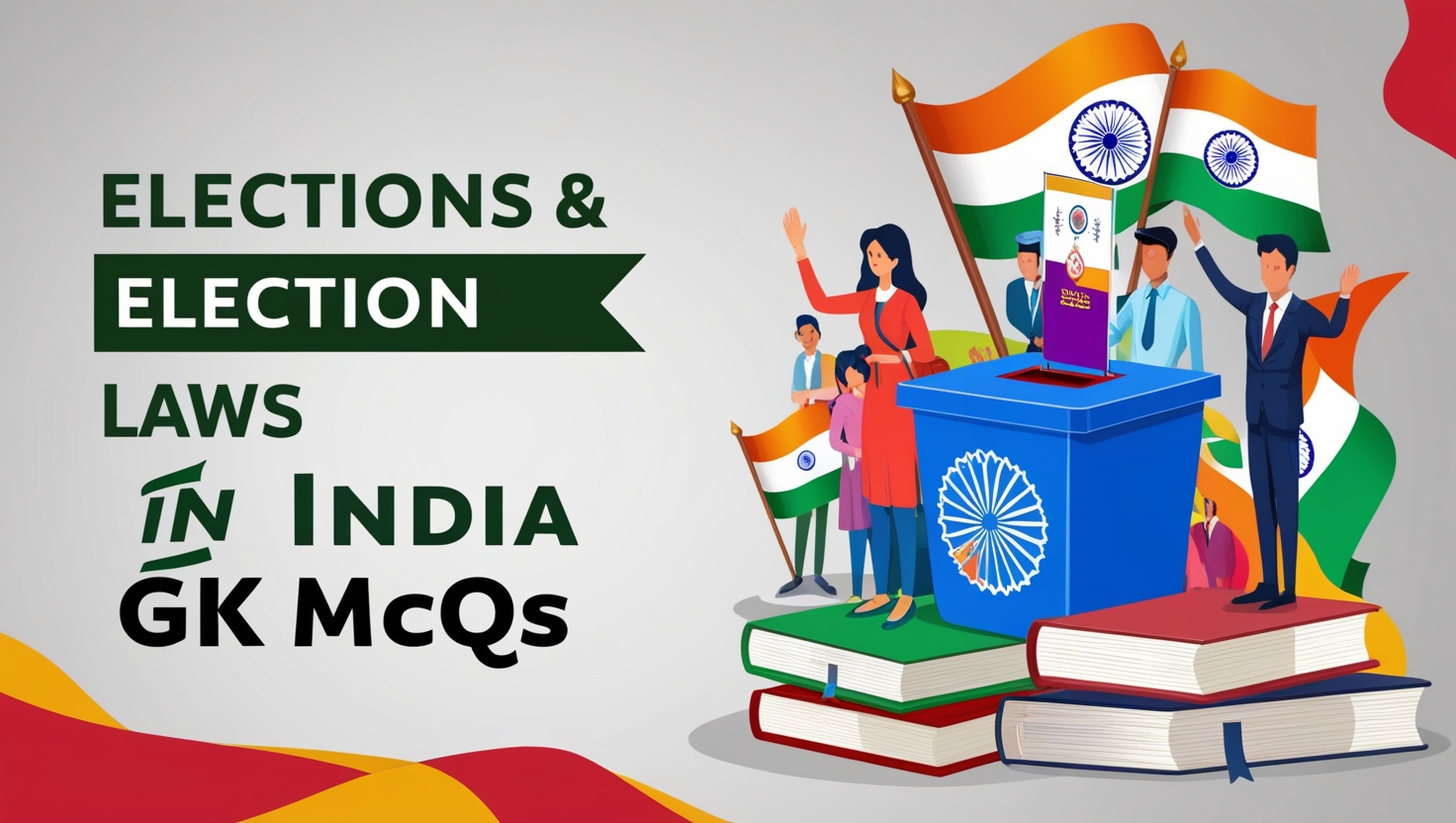
Elections & Election Laws in India GK MCQs With Answer & Explanation in English is an essential resource for anyone looking to deepen their understanding of India’s electoral process. This article offers multiple-choice questions (MCQs) covering key aspects of elections, election laws, and the functioning of the Election Commission of India.
Designed to help students, competitive exam aspirants, and enthusiasts, this guide provides answers and explanations to enhance knowledge and clarity on this important subject
1. Which part of the Constitution makes provisions with regard to the electoral system in India?
- Part XI
- Part XIV
- Part XV
- Part XX
Show Answer
Answer: Part XV
The Articles 324 to 329 in Part XV of the Constitution of India make provisions with regard to the electoral system in India. Article 324 provides for an independent Election Commission to ensure free and fair elections in the country.
2. Who can make provisions with respect to matters relating to delimitation of constituencies?
- Parliament
- President
- Rajya Sabha
- State Legislature
Show Answer
Answer: Parliament
The Parliament of India can make provisions with respect to all matters relating to elections to the Parliament and the state legislatures, including the delimitation of constituencies.
3. Which of the following statements is correct about the orders issued by the Delimitation Commission?
- They are scrutinised by the committee constituted for the same.
- They are subject to judicial review.
- They are final and cannot be challenged in any court.
- None of the above
Show Answer
Answer: They are final and cannot be challenged in any court.
According to the Constitution of India, the orders issued by the Delimitation Commission are final and cannot be challenged in any court. The validity of any law relating to the delimitation of constituencies or the allotment of seats to such constituencies cannot be questioned in any court.
4. Which article empowers the appropriate legislature (Parliament or state legislature) to establish a tribunal for the adjudication of election disputes?
- Article 323A
- Article 323B
- Article 324
- Article 325
Show Answer
Answer: Article 323B
Article 323B of the Constitution of India empowers the appropriate legislature (Parliament or state legislature) to establish a tribunal for the adjudication of election disputes in India.
5. Which of the following has original jurisdiction in case of a poll petition?
- Supreme Court
- High Court
- District Court
- Subordinate Court
Show Answer
Answer: High Court
The High Court has original jurisdiction in the case of a poll petition. The electoral system in India permits poll petitions for resolving election disputes, and the High Court is declared as the court of original jurisdiction, while the Supreme Court has the appellate jurisdiction.
6. First general election in India on the basis of adult franchise was held in which year?
- 1949
- 1950
- 1951
- 1952
Show Answer
Answer: 1952
The first general election in India was held in 1952 on the basis of adult franchise. This was a simultaneous election for both the Lok Sabha and all legislative assemblies of states.
7. In which year elections to the parliament were de-linked from elections to the state assemblies?
- 1961
- 1969
- 1971
- 1975
Show Answer
Answer: 1971
In 1971, elections to the Parliament were de-linked from elections to the state legislative assemblies.
8. Within how many days an elected candidate needs to submit the declaration of his assets and liabilities after taking the oath?
- 60 days
- 90 days
- 100 days
- 120 days
Show Answer
Answer: 90 days
An elected candidate in India needs to submit the declaration of his assets and liabilities within 90 days from taking the oath.
9. Indelible ink which is applied to fingers of voters during elections to prevent double voting contains which of the following?
- Chromite
- Potassium nitrate
- Silver nitrate
- None of the above
Show Answer
Answer: Silver nitrate
The indelible ink which is applied to fingers of voters during elections to prevent double voting contains Silver nitrate (AgNO3). It makes a stain on the skin which is very difficult to wash off.
10. Which is the consequence if NOTA (None of the Above) votes exceed 50%?
- Elections are cancelled
- It does not affect the election results
- Election is again organised in constituencies where NOTA vote was more than 50%
- None of the above
Show Answer
Answer: It does not affect the election results
NOTA votes do not affect the election results even if the NOTA votes exceed 50% of the total votes cast. The winner is selected based on the rest of the votes by the first-past-the-post system.







